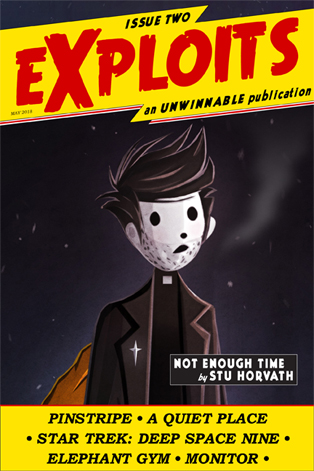
Not Enough Time
 This is a reprint of the featured essay from Exploits #2. If you like what you see, grab the magazine for $2 or subscribe to never miss an issue (note: Exploits is free for subscribers of Unwinnable Monthly).
This is a reprint of the featured essay from Exploits #2. If you like what you see, grab the magazine for $2 or subscribe to never miss an issue (note: Exploits is free for subscribers of Unwinnable Monthly).
———
In a certain kind of mood, on a grey and dreary day, I can look around my house and gain a certain morbid awareness of time. I have more books than I will be able to read over remaining course of my lifetime. Without a doubt, I own more roleplaying games than I will ever have time to run. Thanks to streaming services, I have access to television and film whose hours combined may as well be eternity. In defiance of that slow trickle of sand out of the hourglass, I add to my lists of things I want to watch, play or read every day. When it comes to culture at large, you can never truly be finished. There is always more to behold.
What stories absolutely require my attention? Which can I pass over? Are there any I can ignore? On my deathbed, my regrets will be for books unread and unwritten.
Because of the vastness of human creativity, it seems like folly to ever go back. Even the words we use to describe a story once we have run its course imply a finality. Done. Finished. Complete. When something is particularly good – a book we can’t put down, a TV show we can’t turn off – we say we devoured it. The metaphor of food is a good one. As we experience stories, we internalize their particulars and the emotions they instill. They sustain us, in mind if not in body. Yet there are books and movies to which I am compelled to return again and again.
You can’t eat a meal a second time. You could argue that once a story gives up its secrets, it loses something intrinsic, that knowing is like digestion (in fact, we say we need time to digest a heady story before we can discuss it). Some stories can be like old friends and it may seem as if we glean new insights with age and experience, but this is an illusion. The stories remain the same – we are the ones who have changed.
There is an argument that, when reduced to their core, there are only a handful of possible stories to tell. Georges Polti catalogued them in The Thirty-Six Dramatic Situations and, in my experience, he is difficult to prove wrong. What is Avengers: Infinity War if not #31: Conflict with a God, or the entire Star Wars saga if not #13: The Enmity of Kin?
If the seeming infinity of stories are actually limited to just a few universal plots, then something else must compel us to keep making and experiencing “new” ones. While we can render stories down to their essential salts, the ways of telling are endless. It comes down to the nuance of detail: a beautiful turn of phrase, a perfect camera angle – sublime moments that pass. Like the waves crashing in or a peal of thunder, stories are unchanging but also contain multitudes.
In this realization is freedom from the burden of attempting to experience all the treasures in the vault of culture. I don’t mourn missing a fiery sunset, so why should I fret over the books I will never read?
———
Stu Horvath is the editor in chief of Unwinnable. He reads a lot, drinks whiskey and spends his free time calling up demons. Follow him on Twitter @StuHorvath.




